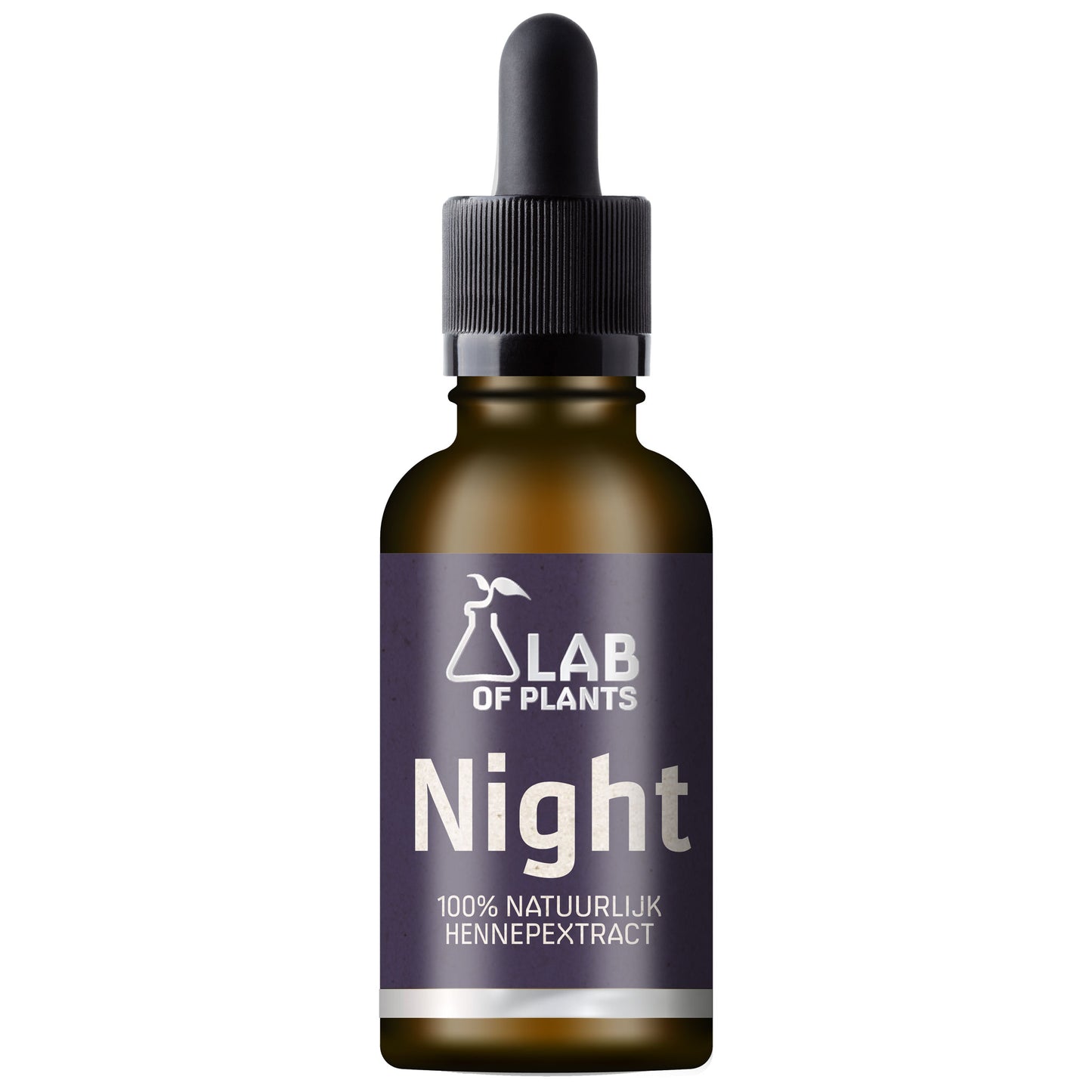
De impact van slecht slapen: gevolgen en oplossingen
6 maart 2025
In dit artikel gaan we in op de invloed van slecht slapen en bieden we praktische handvaten aan om je slaap te verbeteren en stress te verminderen. Daarnaast bespreken we hoe onze CBD-olie meer rust en ontspanning kan bieden, wat kan bijdragen aan een betere slaapkwaliteit.
Inhoud:
- De gevolgen van slecht slapen
- Tips om beter te slapen en stress te verminderen
- Hennepolie en slaap: anekdotische ervaringen
- Conclusie
1. De gevolgen van slecht slapen
Slechte slaap heeft een groot aantal negatieve effecten op zowel je fysieke als mentale gezondheid. Het is belangrijk om te begrijpen hoezeer slaapgebrek je welzijn kan aantasten.
Fysieke gezondheid
Verzwakt immuunsysteem
Een goede nachtrust is cruciaal voor een sterk immuunsysteem. Gebrek aan slaap kan je immuunsysteem verzwakken, waardoor je vatbaarder wordt voor infecties zoals verkoudheid en griep. Je lichaam heeft slaap nodig om zich te herstellen en te regenereren. Chronisch slaaptekort kan deze processen verstoren, wat op de lange termijn ernstige gezondheidsproblemen kan veroorzaken.
Gewichtstoename
Slaapgebrek beïnvloedt de hormonen die je eetlust reguleren. Ghreline, het hormoon dat honger stimuleert, neemt toe, terwijl leptine, het hormoon dat je een vol gevoel geeft, afneemt. Dit kan leiden tot overeten en gewichtstoename, wat op zijn beurt weer andere gezondheidsproblemen kan veroorzaken zoals obesitas en diabetes.
Hart- en vaatziekten
Chronisch slaaptekort is een risicofactor voor hoge bloeddruk, hartziekten en beroertes. Tijdens de diepe slaapfases werkt je lichaam aan het herstel van hart- en bloedvaten. Slecht slapen kan dit proces belemmeren en leidt daardoor tot verergerde cardiovasculaire gezondheidsproblemen.
Mentale gezondheid
Verminderd cognitief functioneren
Slaaptekort heeft een directe invloed op je hersenfuncties. Het vermindert je reactievermogen, concentratie en geheugen. Na een nacht slecht slapen kun je merken dat je moeite hebt om helder te denken en eenvoudige taken uit te voeren.
Stemmingswisselingen en depressie
Mensen die slecht slapen, hebben meer kans op stemmingswisselingen, angststoornissen en depressie. Slaapgebrek beïnvloedt de chemische stoffen in je hersenen die je stemming reguleren, wat kan leiden tot (ernstige) mentale gezondheidsproblemen.
Verhoogde stress
Een slechte nachtrust kan de productie van stresshormonen zoals cortisol verhogen. Dit kan een vicieuze cirkel creëren waarbij stressproblemen met in slaap vallen en doorslapen verergert.
2. Tips om beter te slapen en stress te verminderen
Het is duidelijk dat goed slapen essentieel is voor je gezondheid. Laten we nu enkele strategieën bespreken die je kunnen helpen om beter te slapen en stress te verminderen.
Slaaphygiëne
Consistent slaapschema
Een vast slaapschema helpt je lichaam om een natuurlijk slaapritme te ontwikkelen. Probeer elke dag op dezelfde tijd naar bed te gaan en op te staan, zelfs in het weekend. Dit kan de kwaliteit van je slaap aanzienlijk verbeteren.
Optimale slaapomgeving
Zorg voor een slaapomgeving die bevorderlijk is voor rust. Dit betekent een donkere, stille en koele kamer. Gebruik verduisterende gordijnen, oordopjes of luister naar witte ruis om storende geluiden te minimaliseren.
Vermijd stimulerende middelen
Cafeïne, nicotine en alcohol kunnen je slaap verstoren. Cafeïne, dat te vinden is in koffie, thee en sommige frisdranken, kan je waakzaam houden lange tijd nadat je het hebt geconsumeerd, wat het inslapen bemoeilijkt. Nicotine, een stimulerend middel dat in tabaksproducten zit, kan je slaapcyclus verstoren door je alert te houden, terwijl alcohol, hoewel het je aanvankelijk slaperig kan maken, je slaapfragmentatie verhoogt en de kwaliteit van je slaap vermindert. Het is daarom raadzaam om deze stoffen vooral in de uren voor het slapengaan te vermijden om een diepere en meer onafgebroken slaap te bevorderen.
Mindfulness beoefenen
Dagelijkse meditatie
Mindfulness en meditatie zijn bewezen technieken om je geest te kalmeren en stress te verminderen. Zelfs een paar minuten meditatie per dag kunnen een verschil maken. Er zijn diverse apps beschikbaar die begeleide meditaties aanbieden, wat je kan helpen om mindfulness een vast onderdeel van je routine te maken.
Bewuste ademhaling
Ademhalingstechnieken, zoals diepe ademhaling, kunnen helpen om je hartslag te verlagen en je lichaam voor te bereiden op slaap. Dit kan ook helpen om piekergedachten te verminderen die vaak een goede nachtrust verstoren.
Bodyscan
Een bodyscan kan je helpen beter te slapen omdat het je helpt je lichaam te ontspannen door bewust spanning los te laten, wat je geest ook kalmeert. Ga rustig liggen, sluit je ogen en focus je aandacht langzaam op elk deel van je lichaam, van je tenen tot je hoofd, en merk op waar je spanning voelt. Adem diep in en uit terwijl je elk lichaamsdeel bewust ontspant, dit helpt je om je hoofd leeg te maken en klaar te zijn om in slaap te vallen.
Omgaan met angst
Cognitieve Gedragstherapie (CGT)
CGT is een effectieve methode om angst te verminderen door negatieve gedachten en gedragingen te identificeren en te veranderen. Het kan bijzonder nuttig zijn voor mensen die slaapproblemen hebben als gevolg van angst.
Ontspanningstechnieken
Technieken zoals progressieve spierontspanning kunnen helpen om je lichaam fysiek te ontspannen, wat je kan voorbereiden op slaap. Daarnaast hebben sommige klanten gerapporteerd dat het gebruik van onze hennepolieproducten bijdraagt aan een ontspannen gevoel, wat hen helpt om beter om te gaan met angst.
Routines en gebruiken
Ontspannende bedtijdroutine
Het ontwikkelen van een consistente en ontspannende bedtijdroutine kan je lichaam helpen signaleren dat het tijd is om te slapen. Activiteiten zoals lezen, een warme douche nemen, of naar rustgevende muziek luisteren kunnen deel uitmaken van je routine.
Beperking van schermtijd
Het blauwe licht van schermen kan je natuurlijke slaap-waakcyclus verstoren. Probeer elektronica minstens een uur voor het slapengaan te vermijden. In plaats daarvan kun je kiezen voor activiteiten die je geest rustig maken.
Supplement voor slapen
Voeg een supplement zoals CBD-olie, Night hennepolie of melatonine toe aan je avondroutine. Deze supplementen helpen je beter te slapen door ontspanning en rust in je hoofd te bevorderen. Melatonine en hennepolie staan erom bekend dat ze een goede nachtrust ondersteunen, waardoor je dieper en meer herstellend slaapt. Melatonine is minder geschikt voor langdurig gebruik, terwijl CBD-olie juist wel geschikt is voor langere periodes.
3. Hennepolie en slaap: anekdotische ervaringen
Hoewel wetenschappelijk bewijs voor de effectiviteit van hennepolie bij het verbeteren van slaap nog beperkt is, delen we graag enkele positieve ervaringen van onze klanten. Het is belangrijk om te benadrukken dat deze ervaringen persoonlijk zijn en niet als wetenschappelijk bewijs mogen worden beschouwd.
Klantervaringen
Willem, 39 jaar – 9 januari 2024
“Ik slaap over het algemeen redelijk goed, maar soms met periodes wat minder en word ik regelmatig tussentijds wakker en slaap ik onrustig. Sinds ik de Night hennepolie gebruik voor die periodes voel ik mij meer ontspannen en is het rustiger in mijn hoofd na een stressvolle werkdag. Daardoor slaap ik sneller in en slaap ik ook diep. Ik maak ook gebruik van een slaap app die mijn slaap ’s nachts registreert en je ziet daadwerkelijk verschil in de grafiek die de slaapkwaliteit weergeeft en de tijd dat ik in diepe slaap ben.”
Annemiek, 57 jaar - 2 februari 2024
“Al ruim 10 jaar sliep ik maar maximaal 3 uren per nacht. Dit had een enorme impact op mijn leven en dagelijks functioneren (ik sta voor de klas). Ik heb al veel geprobeerd om mijn nachtrust weer terug te krijgen, van melatonine tot zwaardere middelen, maar van dat alles heeft mij niets echt goed geholpen. Via via kwam ik te weten over de Night hennepolie van Lab of Plants. In het begin was het even zoeken naar de juiste dosering, maar na een maand ervaarde ik in de avond veel meer rust in mijn hoofd en lichaam waardoor ik weer hele nachten doorslaap en uitgerust opsta. Dit is voor mij een enorm positieve verandering en ik heb het plezier in mijn werk weer teruggekregen.”
Rick, 26 jaar – 1 februari 2024
“Als fanatiek atleet ben ik constant op zoek naar manieren om mijn herstel en prestaties te verbeteren. Al tijden sliep ik onregelmatig. Uiteindelijk ontdekte ik de Night hennepolie van Lab of Plants, die me verrassend rustiger liet slapen. Dankzij de diepere nachtrust die ik ervaar, voel ik de volgende dag meer energie en focus tijdens mijn trainingen. Dit heeft een positieve uitwerking op mijn sportprestaties en ik kan ook beter omgaan met stress en spanning.
Martine, 52 jaar - 15 augustus 2024
"De overgang zorgde voor talloze slapeloze nachten en innerlijke onrust, wat een impact had op mijn welzijn. Na het ontdekken van de Night hennepolie van Lab of Plants, ervoer ik al snel meer rust en ontspanning tijdens het slapen. Ik merk dat ik dieper en stabieler slaap, waardoor ik me overdag energieker en meer innerlijk in balans voel. Laatst was de olie op en sliep ik weer beduidend minder goed. Het werkt dus echt! Dankzij mijn verbeterde slaap kan ik beter omgaan met de uitdagingen van de overgang.
4. Conclusie
Slecht slapen kan ernstige gevolgen hebben voor zowel je fysieke als mentale gezondheid. Het is van groot belang om effectieve methoden toe te passen om je slaapkwaliteit te verbeteren en stress te verminderen. Goede slaaphygiëne, mindfulness, angstbeheersing en ontspannende routines kunnen allemaal bijdragen aan een betere nachtrust.
Hoewel de wetenschappelijke onderbouwing voor de effectiviteit van CBD-olie beperkt is, suggereren preklinische onderzoeken en talloze anekdotische ervaringen dat hennepolie kan bijdragen aan meer rust en ontspanning. Dit kan op zijn beurt leiden tot een betere slaapkwaliteit.
Bij Lab of Plants zijn we toegewijd om je te ondersteunen op je weg naar een betere nachtrust en een ontspannen leven. Ontdek hoe onze producten je kunnen helpen om te genieten van een goede nachtrust.
Disclaimer: De ervaringen die in deze blog worden beschreven zijn anekdotisch en niet wetenschappelijk bewezen. Raadpleeg altijd eerst een arts of een gespecialiseerde gezondheidsdeskundige voordat je nieuwe supplementen, zoals CBD-olie, aan je routine toevoegt.
Lab of Plants
Night Hemp Extract - 10 ml
Delen












